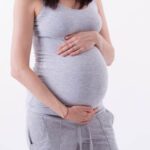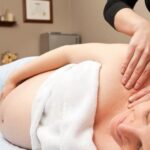Is diarrhea a sign of pregnancy implantation? Many women wonder about this symptom when they suspect they may be pregnant. Understanding the process of pregnancy implantation and its associated symptoms can provide valuable insight for individuals who are trying to conceive or have recently found out that they are expecting.
Pregnancy implantation is a crucial stage in the early development of a fetus, occurring approximately 6-12 days after conception. During this process, the fertilized egg attaches itself to the lining of the uterus, signaling the beginning of pregnancy. While some women may not experience any noticeable symptoms during implantation, others may notice certain signs that indicate their body’s adjustment to the new pregnancy.
Recognizing the signs of implantation can be important for those who are actively trying to conceive. In addition to more commonly known symptoms such as light spotting and cramping, some women may also experience digestive issues such as diarrhea. It is essential to understand how these symptoms are connected to pregnancy implantation and what other factors may contribute to these bodily changes during early pregnancy.
Early Pregnancy Symptoms
During the early stages of pregnancy, many women may experience a variety of symptoms that indicate the successful implantation of the fertilized egg in the uterus. It is important to be aware of these signs as they can provide valuable insight into the early development of pregnancy.
Some common early pregnancy symptoms include:
- Light spotting: Also known as implantation bleeding, this light and short-lived bleeding occurs when the fertilized egg attaches itself to the uterine wall. It is often mistaken for a light period but is usually much lighter and shorter in duration.
- Cramping: Mild cramping or discomfort in the lower abdominal area may occur during implantation as the uterus adjusts to the growing embryo.
- Changes in basal body temperature: Some women may notice a slight increase in basal body temperature, which can be an indicator of pregnancy implantation.
Recognizing these symptoms is crucial for understanding and confirming early pregnancy. However, it is important to note that not all women will experience these symptoms, and some may not experience any noticeable signs of implantation at all.
It’s also worth noting that while diarrhea is often associated with digestive issues, some women wonder if it could be a sign of pregnancy implantation. While diarrhea itself isn’t typically considered a direct symptom of implantation, hormonal changes in early pregnancy can affect digestion and lead to gastrointestinal issues such as diarrhea.
This potential symptom should be considered alongside other indicators of early pregnancy rather than solely as a sign of implantation. If you are experiencing persistent or severe diarrhea along with other unusual symptoms, it’s important to consult with a healthcare professional for guidance and support during this critical time.
Diarrhea and Pregnancy
Many women experience digestive issues during the early stages of pregnancy, and diarrhea is one common symptom that can cause concern. Understanding the connection between diarrhea and pregnancy is important for expectant mothers to ensure they are taking care of their health and well-being. In this section, we will explore the potential reasons for experiencing diarrhea during early pregnancy and how it relates to the process of implantation.
How Diarrhea Is Linked to Pregnancy Implantation
During pregnancy implantation, the fertilized egg attaches itself to the lining of the uterus. This process can result in hormonal changes that affect various systems in the body, including the digestive system. As a result, some women may experience diarrhea as a symptom of these hormonal fluctuations.
Potential Causes of Diarrhea During Early Pregnancy
In addition to hormonal changes related to implantation, there are several other potential causes of diarrhea during early pregnancy. These include dietary changes, increased stress levels, and sensitivity to certain foods. It’s important for expectant mothers to be aware of these factors and consider them when evaluating their symptoms.
Managing Diarrhea During Early Pregnancy
While experiencing diarrhea during early pregnancy can be uncomfortable, there are steps that can be taken to manage this symptom. Staying hydrated, maintaining a balanced diet, and managing stress levels are all important strategies for promoting digestive health during this crucial time. Additionally, it’s essential to consult with a healthcare professional if diarrhea becomes severe or persistent.
By understanding the potential link between diarrhea and pregnancy implantation, expectant mothers can take proactive steps to manage their symptoms and promote overall well-being during early pregnancy. It is important for pregnant individuals experiencing unusual symptoms like persistent or severe diarrhea should consult with a healthcare professional for proper evaluation and treatment.
Hormonal Changes
During early pregnancy, a woman’s body undergoes significant hormonal changes, which can have a direct impact on digestion. The surge in hormones such as estrogen and progesterone can lead to various gastrointestinal symptoms, including nausea, vomiting, and yes, even diarrhea. These hormonal fluctuations can affect the muscles of the digestive system, causing it to either slow down or speed up, resulting in changes in bowel movements.
Impact on Digestive System
The increase in progesterone during early pregnancy relaxes the muscles throughout the body, including those in the digestive tract. This relaxation can lead to food moving more slowly through the intestines, potentially causing constipation. On the other hand, this hormone may also contribute to an increase in intestinal muscle contractions leading to diarrhea. Estrogen levels can also impact digestion by affecting how nutrients are absorbed and how waste is eliminated from the body.
Managing Hormonal-Related Digestive Issues
To manage diarrhea or other digestive issues related to hormonal changes during early pregnancy, it is essential for women to focus on maintaining a healthy and balanced diet. Eating smaller meals throughout the day can help prevent overwhelming the digestive system and minimize discomfort. Staying hydrated is also crucial in managing gastrointestinal symptoms as it can help regulate bowel movements.
When to Seek Medical Advice
While mild diarrhea during early pregnancy is common due to hormonal changes, persistent or severe cases may require medical attention. If diarrhea is accompanied by other concerning symptoms such as fever or dehydration, it is important for pregnant women to consult with their healthcare provider for proper evaluation and treatment.
Understanding the impact of hormonal changes on digestion during early pregnancy can help women better manage any discomfort they may experience. By staying informed and seeking appropriate medical advice when necessary, expectant mothers can better navigate this special time in their lives while prioritizing their health and well-being.
Other Possible Causes of Diarrhea in Early Pregnancy
During early pregnancy, it is common for women to experience a variety of symptoms as their bodies undergo significant changes to accommodate the growing fetus. Diarrhea can be one of these symptoms, and while it may be unsettling, it is not uncommon. Apart from the hormonal changes associated with pregnancy implantation, there are several other factors that can contribute to diarrhea during early pregnancy. Understanding these factors can help expectant mothers manage their symptoms more effectively.
Potential causes of diarrhea in early pregnancy:
- Hormonal Changes: As mentioned in the previous section, hormonal fluctuations play a significant role in many early pregnancy symptoms, including diarrhea. The surge in hormones like progesterone and hCG can affect digestion by slowing down the movement of food through the gastrointestinal tract.
- Diet: Changes in dietary habits or sensitivities to certain foods can also trigger diarrhea in early pregnancy. For some women, consuming large amounts of fiber-rich foods or sudden changes in diet can lead to digestive issues.
- Stress: Pregnancy itself can be a stressful time for many women, especially during the first trimester when concerns about miscarriage and other complications are common. Heightened stress levels can impact gut function and contribute to diarrhea.
It is important for expectant mothers experiencing diarrhea during early pregnancy to pay attention to their overall well-being and seek appropriate care if needed. Consulting a healthcare professional can provide reassurance and guidance on managing digestive issues during this crucial stage of pregnancy. Additionally, making mindful dietary choices and finding ways to reduce stress can also help alleviate symptoms and promote better digestive health during early pregnancy.
Seeking Medical Advice
Pregnancy is a time of great joy and anticipation, but it can also bring about various physical changes and symptoms. Diarrhea is not commonly known as a sign of pregnancy implantation, but some women may experience it as an early symptom of pregnancy. It is important to understand when to seek medical advice for diarrhea during early pregnancy, as it can sometimes indicate an underlying issue that needs attention.
While diarrhea is not typically considered a classic sign of pregnancy implantation, some women may notice changes in their bowel habits in the very early stages of pregnancy. This may be due to hormonal fluctuations that occur during implantation and early pregnancy. However, it is essential to differentiate between normal bodily changes associated with pregnancy and potential health concerns that may require medical intervention.
If you are experiencing severe or persistent diarrhea during early pregnancy, it is crucial to consult a healthcare professional. Additionally, if you notice other worrisome symptoms such as fever, dehydration, or blood in your stool, seeking medical advice becomes even more urgent.
Diarrhea during pregnancy can lead to dehydration and electrolyte imbalances, which can pose risks to both the mother and the developing baby. Therefore, prompt medical attention is necessary to ensure the health and well-being of both mother and child.
| Diarrhea in Early Pregnancy | When to Seek Medical Advice |
|---|---|
| Can be a symptom for some women | If experiencing severe or persistent diarrhea |
| May be related to hormonal changes | If accompanied by fever or dehydration |
| Should not be ignored if causing distress | If noticing blood in stool |
Managing Digestive Issues in Early Pregnancy
Pregnancy is a time of great bodily change, and many women experience digestive issues such as diarrhea during the early stages. While it may not be the most pleasant symptom to deal with, it is important to remember that it is a common occurrence for some expectant mothers.
Diarrhea in early pregnancy can be attributed to a variety of factors, including hormonal changes and increased stress on the body. Understanding how to manage these digestive issues is crucial for relieving discomfort and promoting overall well-being during this crucial time.
One of the main factors that can contribute to diarrhea in early pregnancy is the surge in hormones, particularly progesterone. This hormone is known to have an effect on gut motility, which can lead to looser stools and more frequent bowel movements.
Additionally, the physical changes that occur as the body prepares for pregnancy also play a role in causing digestive disturbances. This includes the relaxation of muscles in the gastrointestinal tract and increased blood flow, all of which can lead to gastrointestinal issues.
In addition to hormonal changes, other possible causes of diarrhea in early pregnancy include dietary factors and increased stress levels. It’s important for expectant mothers to pay attention to their diet and ensure they are consuming foods that are gentle on the stomach. Stress management techniques such as meditation, deep breathing exercises, or yoga can also help alleviate symptoms of diarrhea during early pregnancy.
| Possible Causes of Diarrhea | Management Tips |
|---|---|
| Hormonal Changes | Practice stress-reducing techniques such as meditation or yoga |
| Dietary Factors | Consume foods that are gentle on the stomach (e.g. bananas, rice) |
Final Thoughts
In conclusion, recognizing the signs of implantation and early pregnancy symptoms can be confusing and overwhelming for many women. Diarrhea can be a potential symptom of pregnancy implantation, but it is important to understand that it is not the only indicator of early pregnancy. Hormonal changes play a significant role in affecting digestion during this time, and it is essential to recognize that other factors such as diet and stress can also contribute to digestive issues.
It is crucial for women experiencing diarrhea or any other discomfort during early pregnancy to seek medical advice when necessary. Consulting with a healthcare professional can provide reassurance and appropriate guidance on managing digestive issues while promoting overall well-being. Taking care of oneself physically, emotionally, and mentally during the early stages of pregnancy is vital for both the mother’s health and the development of the growing baby.
In summary, understanding the complexities of early pregnancy symptoms requires patience and attentiveness. It is important to remember that every woman’s experience with early pregnancy symptoms is unique, and seeking professional support when needed can help alleviate any concerns or uncertainties. By taking proactive steps to manage digestive issues and prioritize self-care during this crucial time, women can contribute to a healthy start for themselves and their growing baby.
Frequently Asked Questions
Is Diarrhea a Symptom of Implantation?
Diarrhea is not typically considered a symptom of implantation. Implantation may cause some mild cramping or spotting, but diarrhea is not usually associated with this early stage of pregnancy.
Do You Get Diarrhea at the Beginning of Pregnancy?
Some women do experience diarrhea at the beginning of pregnancy due to hormonal changes and increased progesterone levels. However, it’s not a universal symptom and not all pregnant women will experience this.
Is Diarrhea a Sign of Early Pregnancy Loss?
Diarrhea can be a sign of early pregnancy loss, especially if it is accompanied by other symptoms such as severe abdominal pain or heavy bleeding. It’s important to consult a healthcare provider if experiencing these symptoms to rule out any complications.

Welcome to my fertility blog. This is a space where I will be sharing my experiences as I navigate through the world of fertility treatments, as well as provide information and resources about fertility and pregnancy.





